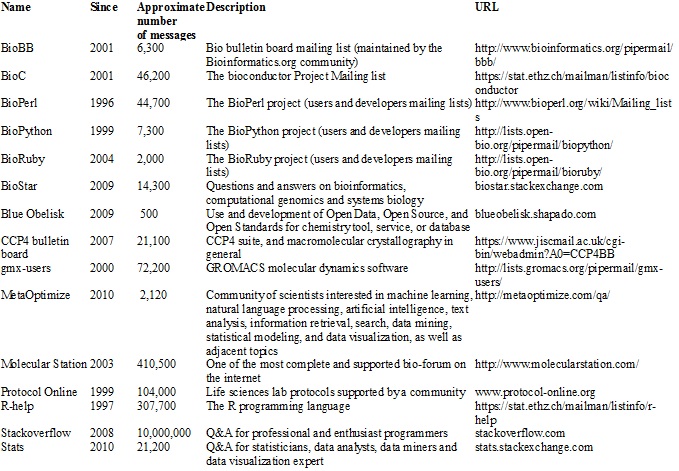With scientific research becoming increasingly interdisciplinary, many researchers find themselves dealing with issues they are not prepared for. A good example of this is how biologists in several fields come to rely on computer programs, and are occasionally ‘forced’ to write their own programs. Vice versa, many computer scientists, interested in bioinformatics, need background information about the biological processes underlying their topic of interest.
Luckily, the internet comes to the rescue. Web forums, mailing lists and online communities of scientists (for some examples of bioinformatics- and biology-related online communities, see table 1) allow researchers from different fields to contact each other easily.
Table 1: Examples of online scientific communities, related to biology and bionformatics.
(Source: Dall'Olio et al., 2011)

A new publication in PLoS Computational Biolgy has now identified ten simple rules for getting help from online scientific communities. These rules are:
Do not be afraid to ask a question.
Nobody can be expected to know everything. As the authors put it:
Asking the right questions should always be a priority in science, and online communities are a good place to practice.
State the question clearly.
Keep the question short and concise, yet include the relevant information. If necessary, break it down into several questions.
New to a mailing list? Learn the established customs before posting.
Learn how the web interface works and browse around a bit to get a feeling of the type of questions posted.
Do not ask what has already been answered.
Speaks for itself, really. If a previous answer does not satisfy you, ask the question again, but be sure to quote the previous response and explain why it is not what you’re looking for.
Always use a good title.
Make it ‘catchy’. People often skim through the questions asked, looking for something that relates to their expertise. Try to be specific without making it too long.
Do your homework before posting.
People in an online community are not your slaves. Show that you’ve tried to tackle the problem yourself initially, and explain where you’ve ran into obstacles.
Proofread your post and write in correct English.
Your question should be clear to a broad audience. So use correct English and try to avoid slang and/or abbreviations.
Be courteous to other forum members.
Try to remain civil and polite. A nice environment will encourage people to contribute. Remember that the people contributing are not paid and are actually doing you a favor by devoting their time and energy to your questions.
Remember that the archive of your discussion can beuseful to other people.
Archives of discussion usually remain on the internet. So, first of all, use your work e-mail address, check your employer’s policy concerning these matters and don’t reveal too much about your personal life. Since the discussion you've started can be useful to others, try to wrap it up with a helpful conclusion.
Give back to the community.
In return for the help you’ve been given, why not help others in return? This doesn’t necessarily have to take the form of answering questions, but can also be done by editing, clarifying matters, or pointing others to previous useful posts.
So, these are the ten rules mentioned in the publication. If you follow these, a helping hand should be readily extended.
Reference
Dall’Olio, G.M.; Marino, J.; Schubert, M.; Keys,K.L.; Stefan, M.I.; Gillespie, C.S.; Poulain, P.; Shameer, K.; Sugar, R.; Invergo, B.M.; Jensen, L.J.; Bertranpetit, J. and Laayouni, H. (2011). Ten Simple Rules for Getting Help from Online Scientific Communities. PLoS Computational Biology 7(9): e1002202. Doi:10.1371/journal.pcbi.1002202. (Click here for the article.)





Comments